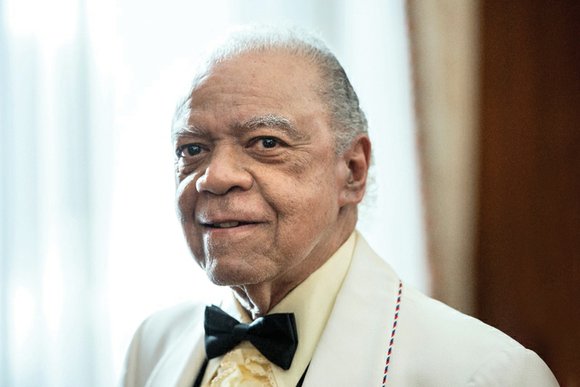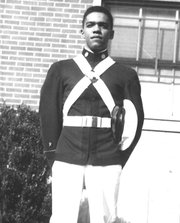First African-American student to attend Va. Tech finally gets degree
Free Press staff report | 5/20/2016, 9:36 p.m.

More than 60 years after Irving Linwood Peddrew III of Hampton broke the color barrier to become the first African-American student to attend Virginia Tech in rural Blacksburg, he finally received his degree.
Mr. Peddrew, now 80, was awarded an honorary bachelor’s of science degree in electrical engineering during the university’s commencement Friday, May 13, at Lane Stadium.
“Regretfully, he was not treated well,” President Tim Sands told the stadium filled with 25,000 people in remarks that both honored Mr. Peddrew and apologized for the actions of the past.
“He suffered social isolation and pervasive discrimination on our campus and in the surrounding community … Three years of isolation and accumulated injustices weigh heavily. His treatment here ultimately compelled him to continue his studies on the West Coast and join the workforce there. That was not his choice. We failed him,” Dr. Sands said.
An honor student at all-black George P. Phenix High School in Hampton, Mr. Peddrew received offers to attend several colleges and universities but selected Virginia Tech.
News outlets from the Roanoke Times newspaper to JET magazine published his photograph, proclaiming that the “first Negro” had been admitted to Virginia Tech after a vote of the university’s Board of Visitors in the fall of 1953.
The board approved his admission because no all-black, state-supported school in Virginia offered electrical engineering, according to one article, and because the board was “appraised by the Attorney General of Virginia of the nature of the decision and precedents laid down by the Supreme Court of the United States, which have taken precedent over Virginia laws …”
Those precedents, coming well before the landmark Brown v. Board of Education decision on May 17, 1954, striking down separate and unequal segregated public education in Virginia and throughout the nation, opened the doors of the all-white, public land grant institution to African-Americans for the first time since its founding in 1872.
Mr. Peddrew, the only African-American among Virginia Tech’s 3,322 students that year, is said to be the first black to attend any historically all-white, four-year public institution in 11 former states of the Confederacy.
In oral histories on file at the university, Mr. Peddrew spoke of the years of isolation and mistreatment at Virginia Tech, where he was a member of the Corps of Cadets. He was not permitted to live on campus or eat in the cafeteria.
He lived in the home of an African-American couple, Mr. and Mrs. William Hoge, about a mile from campus, lugging his cadet uniform and gear back and forth each day. He was allowed to change in the room of another cadet.
In the fall of 1954, three more African-American students entered Virginia Tech, Lindsay Cherry, Floyd Wilson and Charlie Yates. They, too, lived in the home of Mr. and Mrs. Hoge, and all but one left the university before earning a degree.
After attending a six-week, multiracial program in Southern California with students from around the world and comparing their campus experiences, Mr. Peddrew withdrew from Virginia Tech and enrolled in a Los Angeles community college “to get my GPA up,” he said.
Before he could transfer to UCLA or the University of Southern California as he planned, he was drafted into the military and served in communications intelligence in Berlin with the Army Security Agency.
He later worked several years in the aerospace and fruit industries before returning to Virginia, where he worked at the Newport News shipyard and at Hampton University before retiring in 1994.
He never received a college degree — until the ceremony last week at Virginia Tech. It marked only the ninth time in the university’s 145-year history than an individual has been awarded an honorary degree.
“Irving Peddrew succeeded,” Dr. Sands told the audience in making the award. “He set an example of strength and character. He set out to create a path for others to follow and they did. He wanted to make a difference in this community, the commonwealth and the nation. And he has … No one here today is more deserving of this degree than Irving Linwood Peddrew, and it’s long overdue.”
The sea of graduates seated on the Lane Stadium field and the people filling the stands rose in a standing ovation.
Mr. Peddrew, who spoke to a small group of graduates the day before the ceremony, told a Roanoke television station that they should set their goals and aim high.
“Accept the valleys with the high points and realize there will be times when they are challenged,” he said. Even when he worked in various industries, “there were always those you had to contend with who didn’t think as highly of me as I felt they should and who evidenced their feelings of bigotry and narrow-mindedness.
“They are still out there. They haven’t gone away,” he continued. “But never give up, give out or give in. Realize many came before them and made sacrifices. They are walking on the shoulders of those who preceded them.”
Ironically, in 2003, Virginia Tech renamed a residence hall Peddrew-Yates Hall to honor Mr. Peddrew and Mr. Yates, who in 1958, became the first African-American student to graduate from the university. Neither had been allowed to live on campus.







